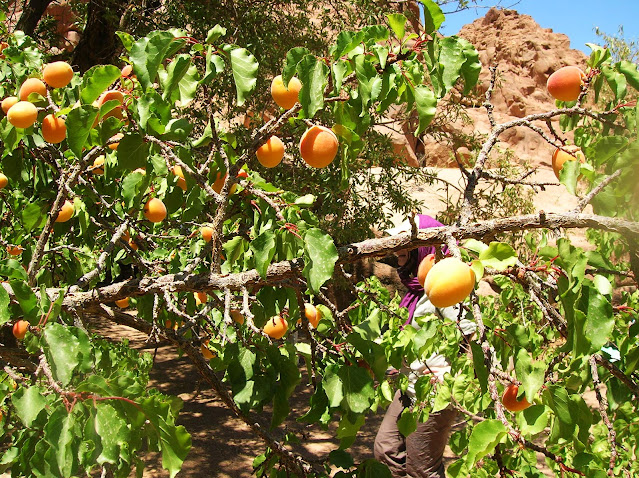Gardens
Click on links to jump to desired sections:
While the Monastery of St Catherine and Mt Sinai are well known sites, this comes as a surprise to most people: there are hundreds of ancient Bedouin orchards, or gardens, in the high mountain “wadis” (valleys) around St. Catherine, many well over a thousand years old, dating back as far as the early Byzantine era. Unfortunately most of the gardens have been abandoned, but there are still many that are cared for to some extent, and around two dozen exceptional ones that are open to receive visitors. Apart from the cultivated traditional orchard and vegetable garden enclosed within the robust dry stone walls, there are also comfortable resting areas for guests (open “arisha” and room), and in several gardens also a basic shower and toilet. All that these places need is little upgrades and fixing existing problems, and they can be viewed as simple “mini-ecolodges”, connected by a network of ancient mountain trails.
The gardening tradition of the high mountains of Sinai has its origin in ealy Byzantine times when there were many monks, hermits and settlers from the Mediterranean living in the region. The high altitude made it possible to grow species not found elswhere in Egypt, although growing them in a desert environment required different techinques. The way gardens are built and the water management system are designed to withstand the strong flash floods that sweep through the region at times, and at the same time to harvest as much water as possible. The gardeners also grafted high yielding fruit species on native trees, providing the local plant's root system to support fruit varieties that otherwise wouldn't survive in this harsh environment. The local Bedouin groups and especially the Jabaleya tribe has taken over this very unique orchard farming tradition, which still lives on today.
Plants grown in the Sinai high mountains:
Fruit trees: Almond Apple Apricot Dates Fig Peach Pear Plum Pomegranate Quince
Other plants: Olives Grapes Vegetables Salad greens Tobaco (local variety)
There is also a wide range of wild medicinal and aromatic herbs in the area, some of them are simetimes grown in gardens, such as habaq (mountain mint), mardagush and zatar (oregano).
Map of gardens
Blue symbol: attraction; Green symbol: garden, nature lodge
List of gardens
Garden of Suliman Eid - Wadi Shrij
Garden of Salem Abu Sayyed - El Fara
Garden of Ramadan Abu Sayyed - Wadi Arbain
Garden of Sbeh Abu Darwish - Wadi Rhazana
Garden of Sbail Taya - Wadi Mathar
Garden of Farhan Abu Karsh - El Khrezi
Garden of Ouda Abu Masaud - Wadi Shaq
Abu Saada garden - Abu Jeefa
Hashash and Masada gardens - Islibet
Garden of Salah Abu Darwish - Wadi Tubuq
Garden of Saad Abu Saada - El Hded
Garden of Mohamed Hashash - El Hded
Garden of Omriya (Umm Saad) - Wadi Zawatin
Garden of Hemid Abu Ghalaba - Wadi Zawatin
Garden of Hussein Abu Tarawa - Wadi Zawatin
Rest house of Hussein Hashash - El Zirri
Garden of Farhan Abu Lheim - Abu Jidda
Garden of Hussein Abu Gneim - Wadi Bulia
Garden of Mohamed and Awad Abu Heb - Wadi Jibal
Garden of Salem Faraj - Wadi Jibal
Garden of Mohamed Musa Abu Lheim - Wadi Jibal
Garden of Mohamed Abu Ghalaba - Farsh Rummana
Garden of Hussein Abu Ghalaba - Farsh Rummana
Garden of Saad Diguni - Wadi Abu Tuweita
Garden of Sharaha Abu Aluan - Wadi Tinya
Garden of Ibrahim Diguni - Wadi Tinya
Garden of Shob Abu Krishan - Wadi Sagr
Garden of Faraj Ahmed - Wadi Shaq-Itlah
Garden of Nasr Diguni - Wadi Itlah
Garden of Dr Ahmed (El Helwa Garden) - Wadi Itlah
Garden of Oda el-Afeli - Wadi Itlah
Garden of the Abu Aluan family - El Freish (Farsh Shama')
Garden of the Hussein Hashash family - Wadi Talaa
List of eco- and nature lodges
Al-Karm Ecolodge
Eid Lodge
Mohammed Musa's Camel School
El Magareen Lodge
Mt Sinai Ecolodge
Lists were compiled in 2019 and some photos are even older.



